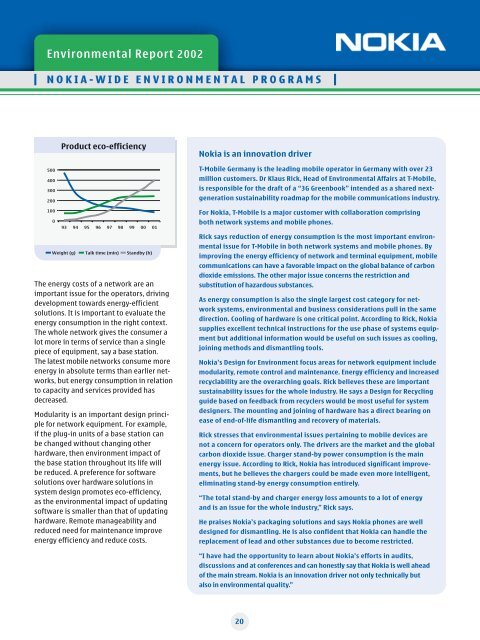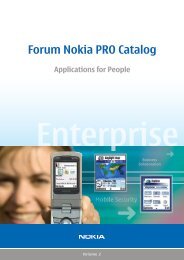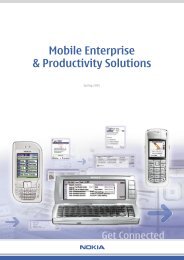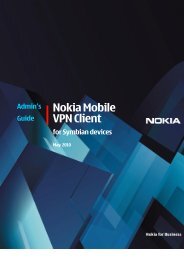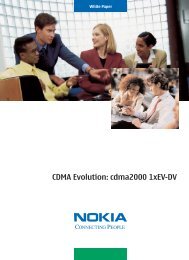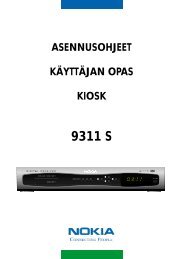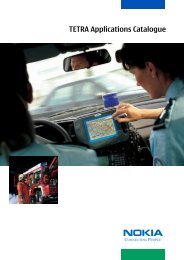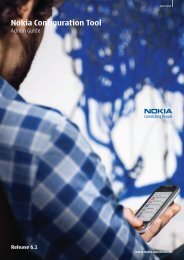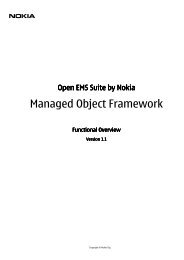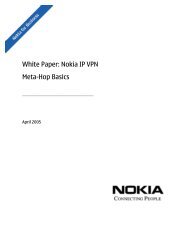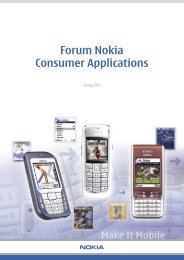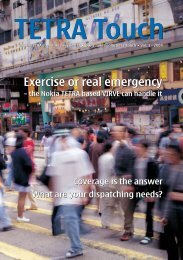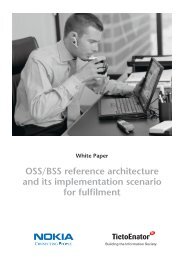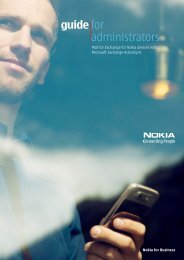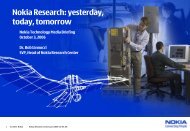Nokia Environmental Report 2002
Nokia Environmental Report 2002
Nokia Environmental Report 2002
You also want an ePaper? Increase the reach of your titles
YUMPU automatically turns print PDFs into web optimized ePapers that Google loves.
<strong>Environmental</strong> <strong>Report</strong> <strong>2002</strong><br />
N O K I A - W I D E E N V I R O N M E N T A L P R O G R A M S<br />
500<br />
400<br />
300<br />
200<br />
100<br />
0<br />
Product eco-efficiency<br />
93 94 95 96 97 98 99 00 01<br />
Weight (g) Talk time (min) Standby (h)<br />
The energy costs of a network are an<br />
important issue for the operators, driving<br />
development towards energy-efficient<br />
solutions. It is important to evaluate the<br />
energy consumption in the right context.<br />
The whole network gives the consumer a<br />
lot more in terms of service than a single<br />
piece of equipment, say a base station.<br />
The latest mobile networks consume more<br />
energy in absolute terms than earlier net-<br />
works, but energy consumption in relation<br />
to capacity and services provided has<br />
decreased.<br />
Modularity is an important design principle<br />
for network equipment. For example,<br />
if the plug-in units of a base station can<br />
be changed without changing other<br />
hardware, then environment impact of<br />
the base station throughout its life will<br />
be reduced. A preference for software<br />
solutions over hardware solutions in<br />
system design promotes eco-efficiency,<br />
as the environmental impact of updating<br />
software is smaller than that of updating<br />
hardware. Remote manageability and<br />
reduced need for maintenance improve<br />
energy efficiency and reduce costs.<br />
<strong>Nokia</strong> is an innovation driver<br />
T-Mobile Germany is the leading mobile operator in Germany with over 23<br />
million customers. Dr Klaus Rick, Head of <strong>Environmental</strong> Affairs at T-Mobile,<br />
is responsible for the draft of a “3G Greenbook” intended as a shared nextgeneration<br />
sustainability roadmap for the mobile communications industry.<br />
For <strong>Nokia</strong>, T-Mobile is a major customer with collaboration comprising<br />
both network systems and mobile phones.<br />
Rick says reduction of energy consumption is the most important environmental<br />
issue for T-Mobile in both network systems and mobile phones. By<br />
improving the energy efficiency of network and terminal equipment, mobile<br />
communications can have a favorable impact on the global balance of carbon<br />
dioxide emissions. The other major issue concerns the restriction and<br />
substitution of hazardous substances.<br />
As energy consumption is also the single largest cost category for network<br />
systems, environmental and business considerations pull in the same<br />
direction. Cooling of hardware is one critical point. According to Rick, <strong>Nokia</strong><br />
supplies excellent technical instructions for the use phase of systems equipment<br />
but additional information would be useful on such issues as cooling,<br />
joining methods and dismantling tools.<br />
<strong>Nokia</strong>’s Design for Environment focus areas for network equipment include<br />
modularity, remote control and maintenance. Energy efficiency and increased<br />
recyclability are the overarching goals. Rick believes these are important<br />
sustainability issues for the whole industry. He says a Design for Recycling<br />
guide based on feedback from recyclers would be most useful for system<br />
designers. The mounting and joining of hardware has a direct bearing on<br />
ease of end-of-life dismantling and recovery of materials.<br />
Rick stresses that environmental issues pertaining to mobile devices are<br />
not a concern for operators only. The drivers are the market and the global<br />
carbon dioxide issue. Charger stand-by power consumption is the main<br />
energy issue. According to Rick, <strong>Nokia</strong> has introduced significant improvements,<br />
but he believes the chargers could be made even more intelligent,<br />
eliminating stand-by energy consumption entirely.<br />
“The total stand-by and charger energy loss amounts to a lot of energy<br />
and is an issue for the whole industry,” Rick says.<br />
He praises <strong>Nokia</strong>’s packaging solutions and says <strong>Nokia</strong> phones are well<br />
designed for dismantling. He is also confident that <strong>Nokia</strong> can handle the<br />
replacement of lead and other substances due to become restricted.<br />
“I have had the opportunity to learn about <strong>Nokia</strong>’s efforts in audits,<br />
discussions and at conferences and can honestly say that <strong>Nokia</strong> is well ahead<br />
of the main stream. <strong>Nokia</strong> is an innovation driver not only technically but<br />
also in environmental quality.”<br />
20


